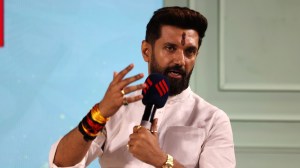You are not going to end Afghan war through a military solution. You have to talk to the enemy
Editor,Strategic Affairs,author and journalist Ahmed Rashid and editor of Pakistans Daily Times,Rashed Rahman,talk about the crisis in Pakistan,Indo-Pak relations and the vacuum in Afghanistan.
In this Idea exchange moderated by C Raja Mohan,Editor,Strategic Affairs,author and journalist Ahmed Rashid and editor of Pakistans Daily Times,Rashed Rahman,talk about the crisis in Pakistan,Indo-Pak relations and the vacuum in Afghanistan
C Raja Mohan: Can we begin with the internal situation in Pakistan after Salman Taseers assassination?
Rashed Rahman: The governor and my publisher,Salman Taseers assassination naturally came as a big shock. What has been very alarming is the kind of bonding between all the mullah parties who,otherwise,are at daggers drawn. You have everyone from lawyers to middle class people,professionals and of course the religious people,proclaiming not only the man who killed Salman Taseer a hero but that the murder was justified and that anyone who dared to challenge the blasphemy laws was a fit case to be murdered. Now,this tells you volumes about the kind of accumulated weight the mullahs have achieved in Pakistan over the past three-four decades. In the same period,we have a decline in the liberal democratic or progressive community.
We dont know,as yet,whether his assassination was an individual act or a deeper conspiracy. In Pakistan,conspiracy theory is the only growth industry. But you cannot rule it out either. Pakistan,as you know,has a very troubled history. Military intervention,jehad,extremism,fanaticism and what not. So,we cannot say,at this point,what was the nature of this event; we dont have a lot of confidence in the government. Also,ever since his assassination,the government has been soft-peddling or back peddling furiously,proclaiming that the law will not be touched.
What people need to understand is that there are multiple crises that have come together. We have a huge economic crisis,the complete collapse of all investments,no energy in the country. We have a huge political crisis with the coalition government facing its own internal problems. And,there is of course,the standard thing between the army and the civilian. And,you have two immediate foreign policy issuesAfghanistan and India.
Ahmed Rashid: On Afghanistan,the first thing is that the Americans have now decided that they want the transformation phase to start by this summer and they want to pull out by 2013. The idea is to hand over to the Afghan army. I dont think this will work. Afghanistan is facing lots of problems with corruption and ethnic tensions rising. There is the threat of the Taliban. Theres been no governance in the last ten years and I dont think it will start spreading now all of a sudden. So,there is a huge vacuum here the international community is ignoring the gap between what to do militarily and what is achievable on the ground. Secondly,there is a huge division in the White House over what the military and civilians want. President Obama is being held hostage by the military. The military speaks the language of political solution but they want a military solution. They still feel that they can shoot their way through the Taliban. And they want another year to do this. But in my opinion,that will eliminate any chances of dialogue with the Taliban. Thirdly,the real solution that President Karzai and the Afghans want is a proper dialogue with the Taliban. A lot of regional countries,including India,are nervous about such talks but you are not going to end this war through a military solution. You need a political solution which will happen only when you talk to the enemy. And this dialogue will not start unless Obama gives the go ahead.
Talks with the Taliban will help ease Asian tensions and rivalries. We have seen Pakistan trying to sell to the US the idea of talks with the Taliban via Islamabad and trying to keep out India. Clearly,this is not feasible. You need some kind of regional coming together of all these desperate countries-Iran,India,Pakistan,Central Asians and China. Unfortunately,there has never been much initiative taken by US or any other country in this direction. India and Pakistan have not talked about Afghanistan since 2001. There is more mistrust between them on Afghanistan than on Kashmir. So,India and Pakistan need to talk to each other,then we need to talk in a regional framework.
C Raja Mohan: What is the minimum or the maximum expectation that Pakistan would like to see happening in Afghanistan?
Ahmed Rashid: The military has never publicly expressed its wishes and I dont think the civilians know what they want out of the political settlement. I presume two positions: one is maximalist with the Americans,which is that we will allow you to talk to whoever you want to talk to whenever you like as long as we are there. Number two,the presence of Indians in Afghanistan should be greatly reduced.
The minimalist or a more reasonable position is that we could use the talks with India on Afghanistan as a means to improve relations and an ultimate resolution on Kashmir. I think the military is adopting both maximalistic and minimalistic positions and is waiting to see what the Americans come up with. At the moment,the Americans have not expressed an opinion on how they visualise talking to the Taliban. Would they do it directly,will they do it through NATO or will they do it through UN? Both sides,US and Pakistan,are guarding their positions. They dont want to expose their positions till the other side does. But I believe that unless there is a dialogue between Iran,Pakistan,India on Afghanistan,you will not get peace there.
Rakesh Sinha: How threatened does Pakistan feel by the Indian presence in Afghanistan?
Ahmed Rashid: I think Indias presence is highly exaggerated. According to the military,the real threat is from the Indian involvement in Baluchistan and funding the insurgency there. It may be possible that the Indians are doing that but they can do it from anywhere. There are more Baluchis in Dubai than in Baluchistan itself. So,if you wanted to fund Baluchistan,you wont be using the Afghan soil. There is a lot of mistrust between Pakistan and India. Your aid programme in Afghanistan is seen in Pakistan as some kind of RAW initiative to make the Afghans pro-India. So,there needs to be more transparency.
Shubhajit Roy: The Indian assessment is that the older Taliban want to talk whereas the younger are more radicalised. Who is more influential in the system?
Ahmed Rashid: My argument with the American military is that the longer you keep killing these commanders in the southall those who belong to the old guard,the leadership of the 90sand if you continue doing this for another year,you will have no one left to talk to. Thats because the radicals replacing them will not talk to you. So,there will be no political settlement,there will be more fragmentation.
At this point,the legitimacy of the old guard is still important within the Taliban and the Afghan people who do support the Taliban. Mullah Omar still has a standing. Whether you like it or not,wherever he is,he will have to sign on this agreement to persuade all the other guys that this agreement is acceptable. He is still regarded as the ultimate leader of the resistance movement.
Amitabh Sinha: How much does Pakistan read into the revelation that Hindu terror could be linked to the Samjhauta Express blasts?
Rashed RAhman: Its come at a very convenient time because so far Pakistan has been in the dock for not cooperating with India on 26/11. Terrorism,whether in the name of Hinduism,or in the name of Islam or any other ism,has become a worldwide phenomenon. It is a phenomenon which states will have to come together to deal with. We used to think that we were exporting jehad to Afghanistan and perhaps Kashmir and it would never come back to haunt us. Some of us had been warning for years that the blow back will arrive some day and it is here now for all of us.
C Raja Mohan: We dont understand the dynamics of what is going on in Punjab in relation to militant groups.
Rashed RAhman: This jehadi enterprise in south Punjab has been going on for a very long time. It is not a new phenomenon,the awareness is new. Southern Punjab is teeming with madrasas that are Saudi funded,Arab funded,etc. Some of them got involved with Kashmir jehad after the Lal Masjid incident in Islamabad in 2007. After that incident,a clear nexus emerged between all militants. They began to coalesce into a sort of informal alliancethe terror came home. No part in Pakistan is being spared. And for the first time,Punjab has come into focus because Punjab is the biggest province,the most developed and considered the heart of the state.
Ahmed Rashid: There is a huge shift in the Punjabi elite as far as talking to India is concerned. People want to do business with India. They want more investment and trade as compared to ten years ago. I think the ice was broken by Vajpayees visit to Pakistan. That is when the trade delegations started to come and Pakistani industrialists began to see that we were not being swamped by cheap Indian goods,that Pakistans goods also have a huge market in Delhi. The military is still trying to hold onto the policy of the cold war. Their policy towards India and Pakistan really has little relevance to the world. The other problem is that the state is collapsing. You could pursue these policies in the 70s and 80s when you had a secure state and economy to back you up but its very difficult to continue these policies when the economic situation is such that you dont know where your salary is coming from next month. All these things have affected the mood of Punjab; if there was a political leadership and if the military was to allow the political leadership to engage with India,there is a great deal of public goodwill to do so.
Sunil Jain: When you say that this terrorism will come to haunt everybody and India too,what exactly do you want everybody to do?
Ahmed Rashid: It is a question of whether you are addressing the issue adequately or not. I dont have a magic wand that I can wave and tell you how exactly we will get over it but one thing I know for sure: we must engage honestly and put our cards on the table. Terrorism is a common problem now and engagement is the only way out.
Now,you will immediately say,we are ready but is Pakistan ready? Here is the problem. You might recall that the existing government in Pakistanthe Peoples Party led coalition government and President Zardariinitially made an effort to reach out to India. He said a few things that acted like red flags to a bull in Pakistan like,Everything that was happening in Kashmir is terrorism or,No first use of nuclear weapons. He received a rap across the knuckles,not publicly but privately,and ever since then,the mutual distrust and suspicion between the civilian government and the military establishment has been exacerbated. Courage is needed,statesmanship is needed,vision is needed.
Rashed RAhman: One guess: I think there is a going to be a huge international pressure this year for both countries to engage on Afghanistan because this is crunch time for US and NATO,for President Karzai and for everyone else in the region. The West knows that both India and Pakistan are potential spoilers in Afghanistan. If one country does not get what it wants,it can spoil it for the other country or for Afghanistan. The last thing India wants to see is a dialogue with Taliban without its own involvement. And being in the picture means you have to talk to Pakistan because Pakistan,whether we like it or not,is going to play a major role in whatever kind of settlement happens.
Sunil Jain: How will India talk to Pakistan if the Pakistani military does not want a conversation? Also,can talks on tackling terror take place when there are American troops on the ground?
Rashid Rahman: There is a problem in civil-military relations in Pakistan,it has a history. The military may have its own notion on what is best for Pakistan. The civilian government must have the courage to continue with this dialogue and persuade the military that this is in the best interests of Pakistan and the region.
As for American troops,I was never in favour of an intervention,for three reasons: one,we have a track record of American and western intervention. It is easier to get them in,but much more difficult to get them out. Secondly,I am familiar with Afghanistans history. It is not called the graveyard of empires for nothing. This will not succeed. Every occupier has found that they cannot by force overcome Afghan nationalism. Thirdly,I was afraid of the spillover for Pakistan.
Ruchika Talwar: How do you view Indias role in Afghanistan,as an observer of Afghanistan and a Pakistani national?
Ahmed Rashid: India has historically had a role in Afghanistan. I think Afghanistan would still like India to be there. On the issue of consulates and the Indian diplomatic presence,the fact is that all the major neighbouring statesIndia,Iran,Pakistan and the former Soviet Union,now Central Asian stateshave the right to have four consulates in Afghanistan. At the moment,only India,Iran and Pakistan have them.
Thirdly,Indias aid programme has been very productive and far more cost effective than a lot of western aid programmes. You have reached out to all sections of Afghan society which very few western programmes have been able to do. But,I think the main complaint and fear is that India should not use the Afghan border to subvert parts of Pakistan,whether it is supporting Sindhi nationalism or Baluchi nationalism. I dont think much is needed in getting the disputes on Afghanistan solved,as long as the will is strong. Its not as complex as Kashmir.
Transcribed by Hamari Jamatia


- 01
- 02
- 03
- 04
- 05





























